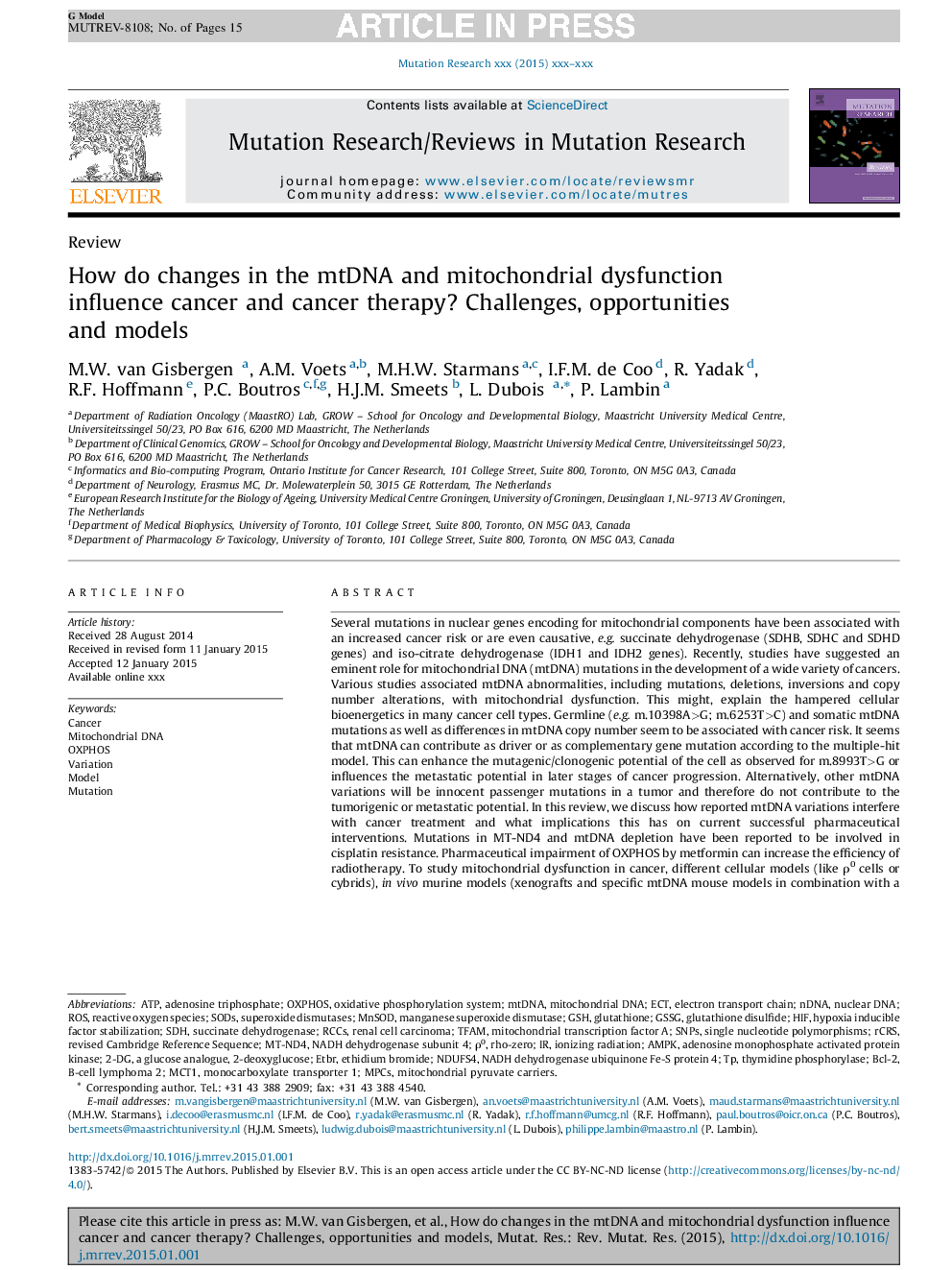| کد مقاله | کد نشریه | سال انتشار | مقاله انگلیسی | نسخه تمام متن |
|---|---|---|---|---|
| 8456713 | 1548750 | 2015 | 15 صفحه PDF | دانلود رایگان |
عنوان انگلیسی مقاله ISI
How do changes in the mtDNA and mitochondrial dysfunction influence cancer and cancer therapy? Challenges, opportunities and models
دانلود مقاله + سفارش ترجمه
دانلود مقاله ISI انگلیسی
رایگان برای ایرانیان
کلمات کلیدی
HIFGSHOXPHOSnDNABcl-2GSSGMnSODEtBrTFAMAMPKMct12-DeoxyglucoserCRSNADH dehydrogenase subunit 4revised Cambridge Reference SequenceRCCsNDUFS4ρ0SDHSNPsMPcsECTMitochondrial DNA - DNA میتوکندریاNuclear DNA - DNA هسته ایROS - ROSAdenosine Triphosphate - آدنوزین تری فسفاتATP - آدنوزین تری فسفات یا ATPAdenosine monophosphate activated protein kinase - آدنوزین مونوفسفره فعال پروتئین کینازethidium bromide - اتیدیوم برومایدionizing radiation - تابش یوننده یا پرتوهای یونیزانVariation - تغییرThymidine phosphorylase - تیمیدین فسفوریزاسmutation - جهشmtDNA - دیانای میتوکندریاییelectron transport chain - زنجیره انتقال الکترونCancer - سرطانmanganese superoxide dismutase - سوپر اکسید دیسموتاز منگنزsuperoxide dismutases - سوکسوکس دیسموتازهاsuccinate dehydrogenase - سوکسیناد دهیدروژنازOxidative phosphorylation system - سیستم فسفوریلاسیون اکسیداتیوmitochondrial transcription factor A - عامل رونویسی میتوکندری AB-cell lymphoma 2 - لنفوم سلول B 2Model - مدلmonocarboxylate transporter 1 - مونوکربوکیلات 1SODs - پادشاهانSingle nucleotide polymorphisms - پلیمورفیسم تک نوکلئوتیدیRenal cell carcinoma - کارسینوم سلول کلیوی یا RCC Glutathione - گلوتاتیونglutathione disulfide - گلوتاتیون دی سولفیدReactive oxygen species - گونههای فعال اکسیژن
موضوعات مرتبط
علوم زیستی و بیوفناوری
بیوشیمی، ژنتیک و زیست شناسی مولکولی
تحقیقات سرطان
پیش نمایش صفحه اول مقاله

چکیده انگلیسی
Several mutations in nuclear genes encoding for mitochondrial components have been associated with an increased cancer risk or are even causative, e.g. succinate dehydrogenase (SDHB, SDHC and SDHD genes) and iso-citrate dehydrogenase (IDH1 and IDH2 genes). Recently, studies have suggested an eminent role for mitochondrial DNA (mtDNA) mutations in the development of a wide variety of cancers. Various studies associated mtDNA abnormalities, including mutations, deletions, inversions and copy number alterations, with mitochondrial dysfunction. This might, explain the hampered cellular bioenergetics in many cancer cell types. Germline (e.g. m.10398A>G; m.6253T>C) and somatic mtDNA mutations as well as differences in mtDNA copy number seem to be associated with cancer risk. It seems that mtDNA can contribute as driver or as complementary gene mutation according to the multiple-hit model. This can enhance the mutagenic/clonogenic potential of the cell as observed for m.8993T>G or influences the metastatic potential in later stages of cancer progression. Alternatively, other mtDNA variations will be innocent passenger mutations in a tumor and therefore do not contribute to the tumorigenic or metastatic potential. In this review, we discuss how reported mtDNA variations interfere with cancer treatment and what implications this has on current successful pharmaceutical interventions. Mutations in MT-ND4 and mtDNA depletion have been reported to be involved in cisplatin resistance. Pharmaceutical impairment of OXPHOS by metformin can increase the efficiency of radiotherapy. To study mitochondrial dysfunction in cancer, different cellular models (like Ï0 cells or cybrids), in vivo murine models (xenografts and specific mtDNA mouse models in combination with a spontaneous cancer mouse model) and small animal models (e.g. Danio rerio) could be potentially interesting to use. For future research, we foresee that unraveling mtDNA variations can contribute to personalized therapy for specific cancer types and improve the outcome of the disease.
ناشر
Database: Elsevier - ScienceDirect (ساینس دایرکت)
Journal: Mutation Research/Reviews in Mutation Research - Volume 764, AprilâJune 2015, Pages 16-30
Journal: Mutation Research/Reviews in Mutation Research - Volume 764, AprilâJune 2015, Pages 16-30
نویسندگان
M.W. van Gisbergen, A.M. Voets, M.H.W. Starmans, I.F.M. de Coo, R. Yadak, R.F. Hoffmann, P.C. Boutros, H.J.M. Smeets, L. Dubois, P. Lambin,